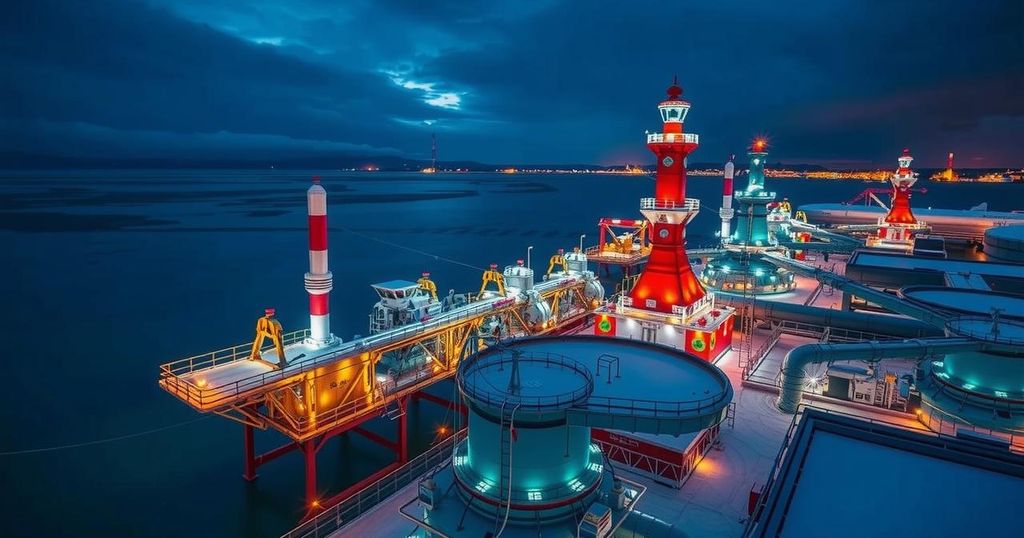COP29 in Baku witnessed a significant Russian presence, as it leveraged the platform to prioritize gas and oil negotiations with Azerbaijan over genuine climate action. Azerbaijani President Ilham Aliyev emphasized fossil fuels in his opening address, reflecting a paradigm shift towards Moscow. Despite efforts to mediate energy agreements with the EU and Ukraine, Russia’s strategies indicated a focus on circumventing sanctions while bolstering energy ties with Azerbaijan, raising questions about their commitment to environmental goals.
The UN Climate Change Conference, COP29, held in Baku from November 6 to November 22, showcased Russia’s substantial engagement with a delegation comprised of 900 members. It was evident that Russia, with Azerbaijan’s collaboration, redirected the discussions from combating climate change to negotiating gas and oil partnerships amidst sanctions. Azerbaijani President Ilham Aliyev’s remarks during the conference denigrating the West underscored Azerbaijan’s growing proximity to Moscow, indicating a shift in its geopolitical alignments since the onset of the Ukraine conflict.
Aliyev described fossil fuels as a “gift from God,” while the conference’s atmosphere highlighted Azerbaijan’s pivot away from Western cooperation. His critical stance towards the West was further emphasized by the absence of French Climate Minister Agnès Pannier-Runacher, reflecting rising tensions. The conference not only facilitated the strengthening of Moscow-Baku relations but also spotlighted Russia’s oil and gas interests at the expense of genuine climate action.
The conference allowed high-level discussions and reaffirmed Russia’s energy priorities over environmental commitments. Baku’s mediation attempts for agreements between Russia, Ukraine, and the EU remained largely unfruitful, yet the presence of Russian energy giants at COP29 emphasized ongoing negotiations aimed at circumventing sanctions. Such initiatives included discussions on relabeling Russian gas as Azerbaijani gas to maintain exports despite EU sanctions.
COP29 served as a strategic venue for Russia to enhance its influence alongside Azerbaijan, whose ties with Russia have deep historical roots. Azerbaijan has increasingly engaged with Russian firms and facilitated discussions for future energy cooperation, undermining the EU’s RePowerEU plan aimed at replacing Russian gas by 2027. The Russian delegation’s focus on investment and trade in fossil fuels starkly contradicted the conference’s stated goals of promoting climate action.
While Azerbaijan boosts its gas imports from Russia, internal political dynamics in the region remain fraught, particularly with tensions surrounding Armenia. Human rights concerns, including the arrest of eco-activists in Azerbaijan who challenge the fossil fuel sector, highlight broader issues of governance overshadowing environmental discussions. Furthermore, Azerbaijan’s substantial reliance on fossil fuel revenues for its economy signals a reluctance to pivot towards sustainable alternatives, complicating the global fight against climate change.
COP29, a pivotal UN Climate Change Conference, was hosted in Baku, Azerbaijan, amidst the backdrop of fluctuating geopolitical alliances influenced by Russia’s ongoing conflict in Ukraine. As the third-largest delegation at the conference, Moscow’s extensive participation signaled its intent to use the event not just for climate dialogue, but also for advancing its energy interests through partnerships with Azerbaijan. The shifting dynamic of Azerbaijan’s foreign policies from the West towards closer ties with Russia raises critical questions regarding the future of climate policy in the region and the EU’s energy dependency amidst sanctions placed on Russian entities. Additionally, Azerbaijan’s substantial economic reliance on fossil fuels dictates much of its political posture, often clashing with internationally espoused climate goals. The tension between climate rhetoric and fossil fuel dependency emerges as a significant theme, illustrating the challenges faced by nations in transitioning to more sustainable practices while managing economic imperatives. The summit surface not only climate issues but also broader geopolitical maneuvers indicative of a realignment in energy strategies globally.
The discourse during COP29 indicates a stark departure by Azerbaijan and Russia from the core objectives of climate change mitigation, favoring instead strategic energy alliances that circumvent Western sanctions. Azerbaijan’s overt support for fossil fuels, juxtaposed with its collaborative engagements with Russia, affirms a geopolitical shift away from Western dependency, increasing the complexities surrounding EU energy policies. Overall, the conference underscored the prevailing tension between climate aspirations and fossil fuel dependency, challenging the credibility and effectiveness of global climate initiatives.
Original Source: theins.ru






